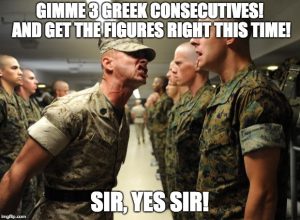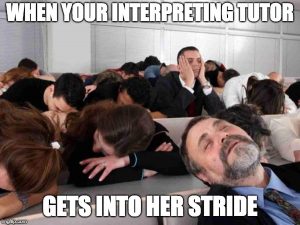I hesitated about the title of this blog post for a long time. Not least because it sounds as if I’m writing about shoes.
At first, I wanted to write about what I have learned from my students over the years. And then I wanted to write about how students can help their trainers step up and do better, because that is what some of my students do for me. Really, I’m writing about the symbiosis between student and trainer that can lead to breakthroughs on one side and excellence in teaching on the other.
But all of this is difficult to encapsulate in a blog title. I reckon if you read on, you’ll see what I’m getting at. So please bear with me. *
What my students have taught me
Every so often, I hear a teacher/trainer/tutor say ‘I learn so much from my students’. And on my jaded days, I think: ‘Nope, I’ve learned diddly squat from my students today. And that’s because they have no life experience, they need a bit more get-up-and-go, and the education system has given them a sense of entitlement and little idea of what independent thought looks like. And now I’m old, they all look about 15.’
And then I give myself a good slap round the head.

Sometimes I just forget what it’s like to start out – not in all areas, because I’ve certainly taken up new activities and learned new skills as an adult (I’m a permanent beginner when it comes to driving and parking, for instance, and have only just begun a long journey in web building and marketing) – but it’s a long time since I was a postgrad student. Let’s face it, when I embarked on my interpreter training course at the tender age of 21, I was deeply ignorant about current affairs, had very little work experience, and was probably more sheltered and naive and certainly vastly less streetwise and tech-savvy than students today. This is, in fact, totally normal. It doesn’t mean I had nothing to contribute, and the same goes for my students today.
I don’t learn from all my students every day (and let’s be honest: they probably don’t learn something new from me every single day), but some of my most valuable lessons as a trainer have come from my students.
Grit and determination
Acquiring the skill set required to become a professional interpreter is hard. Attending an interpreting course where you receive feedback on your performance every day in front of all the other students is very hard, psychologically speaking.
I benefited (if you can call it that) from the bootcamp style of interpreter training: short, fairly brutal, and effective (if traumatic).

I was fortunate enough to pass the final exam, and start work straight away with a good employer. So all the hard stuff was done in six months, with a good outcome at the end. So all the hard stuff only appeared to last six months (but after that there was a massive learning curve which still hasn’t ended…).
It doesn’t happen like that for everyone. In fact, these days, what with the labour market in general and the interpreting market in particular being quite different from 25 years ago, students have to a) make it through their interpreting course successfully, and b) market themselves successfully in order to find any work in a sometimes saturated and ungrateful market. They need bucketloads of versatility, determination, professionalism, and skills I just didn’t need or have when I started out. And they need many more strings to their bow.
Every so often I come across a student who deeply impresses me with his or her ability to navigate the myriad challenges I’ve just mentioned with grace and enthusiasm, and who demonstrates maturity, resilience, and willingness to learn. A couple of years ago I had a student in my French interpreting class, E., who never gave up. She wasn’t in the top spot at the beginning of the year and it wasn’t all plain sailing. She had issues with her delivery and use of English that needed addressing. But she Never. Gave. Up. She listened to feedback, she applied feedback, she worked hard, she worked well with others, she welcomed advice but didn’t need hand-holding, and after graduating, she set herself some goals and went after them with passion and determination. Perhaps it had something to do with her hobby of weightlifting, and that mental attitude carried over into her interpreting, I don’t know. She certainly had exactly the right mindset to make progress. By the time she graduated, her skills had improved significantly, and she hasn’t rested on her laurels. She is now actively involved in organising collaborative practice groups for colleagues, as well as consolidating her interpreting skills, blogging, and working on a retour.
The reason I mention this student is because she was a great reminder to me of how much can be achieved with tenacity and dogged determination, even if you don’t start from the most comfortable position.
Sometimes there seems to be a feeling among trainers that interpreters are born, not made; that you need special talents to become an interpreter, and that if you lack innate talent, you will fail.
I love this reminder from E., and some of my other students, that you can achieve so much in life by just doing the work without excuses or procrastination, and that success doesn’t have to be immediate. It may take a few months or a few years longer, but it is success nonetheless (some of my former students passed accreditation tests at European Institutions or started work as professional interpreters several years after graduating). The lesson here for trainers is never to give up on students who are struggling or taking longer than expected to pick up skills.
It is a joy to watch students’ tenacity and enthusiasm in working towards and achieving their goals, and as someone who suffers from perfectionist tendencies (if I can’t get something right first time, I tend to give up), I really admire their attitude.
New technologies
I quite like new technologies. Here I am, writing a blog, organising webinars and running several websites. Nevertheless, I am not a digital native, and my son (aged 10) can already do far more than I can with the TV remote and iPad.

One of the great things about being a trainer is that the contact with students helps me keep up (a little) with new technologies.
Students have a completely different experience at university these days. When I was a student, email didn’t exist, and word processing was in its infancy. I handed in handwritten work and couldn’t consult google.
These days, students have virtual learning environments, timetable apps, access to lecture recordings, Facebook groups, and more. At the universities where I teach, they also have equipment that can record their performances in the booth, video conferencing equipment in the room, and a smart whiteboard.
If not for my students, I would be one of these:
 The fact that our students’ learning environment has evolved so much leads us, as trainers, to think about how we can tap into all these new possibilities; how we can use new technologies to enhance learning, improve productivity, save time, or connect with colleagues around the world.
The fact that our students’ learning environment has evolved so much leads us, as trainers, to think about how we can tap into all these new possibilities; how we can use new technologies to enhance learning, improve productivity, save time, or connect with colleagues around the world.
My students’ familiarity with the Internet, file sharing, and Facebook, for example, led directly to the creation of Speechpool. The increasing use of blended learning has led me to create my new site, The Interpreting Coach. Initiatives such as ORCIT (online resources for conference interpreter training), the SCIC/EP speech repository, streaming of mock conference by many universities, and new apps for interpreters, are the direct result of a) the availability of new technologies, but above all b) the way students and early adopters use and want these new technologies.
It’s when students ask the questions (how can I find practice material/find a practice partner anywhere in the world/organise my glossaries?) that we trainers can look for answers and consider how we can do things better inside or outside the classroom.
Questions, questions
They say there is no such thing as a stupid question. And indeed, as a trainer, I welcome questions. Nobody likes to deliver a lecture and see glazed eyes and bored looks; at least questions from the floor suggest that the audience has been listening.

Sometimes my students or coaching clients ask questions – about interpreting technique or use of language – that are very difficult to answer. I struggle with these, because I don’t want to give a confusing or misleading answer; and because language is full of nuance and subjectivity, and I can’t always offer unambiguous or definitive answers.
These questions, though, are my lifeblood as a trainer. They force me to reflect on technique or use of English. They help me to look at my own language differently. They spur me on to give clearer explanations, or to develop teaching materials to explain the linguistic challenge in question.
Just this morning, a coaching client asked me to explain salami technique (also known as ‘chunking’). It was a great opportunity for me not only to explain the principle, but to find specific examples at the syntactic level to explain the advantages of the technique. When I’m asked to explain something I take for granted in my own interpreting, it’s a great opportunity to take a fresh look at it and see if there is a different or better illustration that will be easier for students to grasp.
Another example: in developing materials for my online membership site, Rock your Retour, for English retourists, I have been heavily inspired by my coaching clients’ questions, and also by their mistakes (why did they use a particular word or phrase? What would have sounded better?). If not for them and my students, my relationship with English, and with interpreting, would stagnate. Instead, my students give me an opportunity to grow, learn, and explain better, and I’m grateful for it.
Students, help your trainers rock!
If you’ve read this far, you’ll have understood, I hope, that when I’m not swamped by my workload and the odd bout of pessimism about the profession, I am both grateful to my students and inspired by them. They make me a better trainer. I don’t believe that training and coaching should take an entirely top-down approach; nor do I believe that 100% student-led learning is necessarily successful. Instead, I like to think of the interpreting student + trainer relationship as being closer to the relationship between a mentor and mentee. A mentor guides mentees to reach their full potential; but a mentor cannot teach every student the same thing, or in the same way. He or she must adapt and respond to the students’ needs and wants.
I didn’t want to end this post, therefore, without giving all the students out there some advice about how you can help your trainers help you. We trainers want to give the best of ourselves, and we want our teaching to be useful. And you can help us do that. How?
- Ask questions! Don’t be passive. Instead, take control of your learning. Ask (pertinent) questions (have I said that already?). Spur us on to think critically about language and technique and offer you clearer insights.
- Listen to feedback and advice. Try it out when you next interpret.
- Adopt a growth mindset. Don’t worry if you’re not perfect at first: you are a beginner. All the stages of your learning are building blocks towards success. This means perfectionism (in the negative sense of ‘all or nothing thinking’) has no place in your learning; instead, be determined and hard-working, and remember that mistakes help you learn.
- As a learner, be active, responsible and curious. Try to absorb the advice and insights that your trainers and fellow students can give you, and to use them to become an independent learner. You will spend a brief period of time with your trainers, and the rest of your life maintaining and improving your own skills with far less guidance, so remember that your goal is not to absorb knowledge but to acquire skills and the right mindset for success.
In short, be teachable!
I think it would be grossly unfair, though, to encourage students to be teachable without asking the same of trainers. We’ve all heard of lifelong learning, and anyone who is a professional interpreter knows that you have never finished learning a language or picked up every bit of terminology on a given subject. But I think it’s worth considering how trainers can keep learning and improving too.
With the right approach on both sides, it seems to me that students and trainers can push one another to give more and do better, and create a relationship that is genuinely mutually beneficial.
Trainers, what’s the most valuable lesson you have learned from your students?
*This is, in fact, a phrase I hate. But it is ubiquitous in the UK.
 ROCK YOUR RETOUR – A MEMBERSHIP SITE FOR ENGLISH RETOURISTS
ROCK YOUR RETOUR – A MEMBERSHIP SITE FOR ENGLISH RETOURISTS
Rock your Retour is a unique, new way to improve or maintain your English retour:
With this self-paced programme incorporating live classes, teaching materials and ongoing support, you can boost your skills and confidence and become more marketable.
- guidance from an experienced interpreting coach who is a native speaker of English
- opportunities to receive feedback about your production of English and interpreting skills
- teaching materials tailor-made for interpreters, with an emphasis on English usage (terminology, syntax) and skills
- ongoing support
- flexible, affordable, self-paced learning
- time commitment dependent on your availability and motivation
- affordable package with no tie-in
Find out more here.
 Sophie Llewellyn Smith, writing as The Interpreting Coach, is a coach, interpreter trainer, conference interpreter, designer of online teaching materials, and creator of Speechpool. Follow the blog to pick up tips on how to improve your interpreting skills, and check out the website for digital material to complement your face-to-face learning and empower you to take control of your learning. If you’re interested in personal coaching, why not book a free discovery call?
Sophie Llewellyn Smith, writing as The Interpreting Coach, is a coach, interpreter trainer, conference interpreter, designer of online teaching materials, and creator of Speechpool. Follow the blog to pick up tips on how to improve your interpreting skills, and check out the website for digital material to complement your face-to-face learning and empower you to take control of your learning. If you’re interested in personal coaching, why not book a free discovery call?

